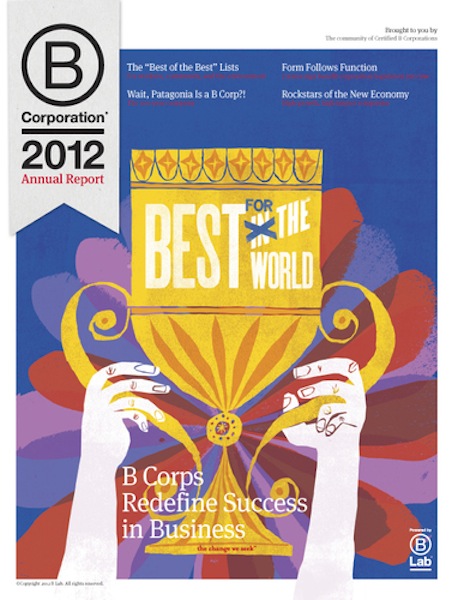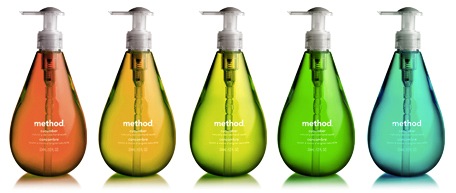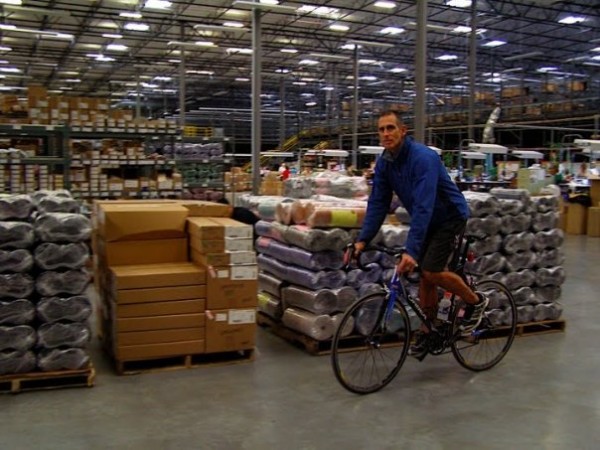If you’ve ever walked around a LEED-certified building, it soon becomes clear that they aren’t your average energy-hogging structures. Any number of features might tip you off to that fact, from the low-flow fixtures to the use of passive lighting to the solar panels.
But when it comes to corporate America, being able to determine if a company is as socially responsible as its marketing materials claim is far more difficult. That’s where B Lab comes in. The nonprofit has developed a framework in which companies can receive a special B Corporation certification. The “B” stands for “benefit” and the founders liken it to LEED-certification for businesses.

While the concept of companies having a grander purpose beyond raking in maximum profits isn’t anything new, the formal certification process and third-party assessment for B Corps came about just six years ago. Already, sustainable outdoor retailer Patagonia and eco-conscious soap maker Method have joined the ranks of well-known certified B Corps.
Development of the certification was conceptualized when B Lab Co-Founders Andrew Kassoy, Jay Coen Gilbert and Bart Houlahan joined forces in 2006. With their backgrounds as entrepreneurs (Jay and Bart founded a $250 million basketball and apparel business) and investors (Andrew was a private equity investor) the three set out to change the way the corporate world functioned.
“We were realizing that there were some structural impediments in the marketplace and what B Lab should be doing is creating a new market infrastructure,” Kassoy said.
That new infrastructure places the interest of the workers, the community and the environment above the interest of the shareholders or the bottom line. To be certified as a B Corp, a company needs to write social responsibility policies into their bylaws and measure up to environmental, accountability and social standards.
“When we started, we decided we shouldn’t do anything that requires changing the law, so we should start with a certification,” Kassoy said.

Certifying companies based on social and environmental metrics was a consuming goal, but one that soon gained traction. By 2009, 220 companies had been certified. One year later, Maryland became the first state to pass legislation allowing businesses to legally form their business under the B Corp. name. Since then, seven other states including California and New York have passed similar legislation.
A company doesn’t have to be based in one of the seven states to be B Corp certified, however. That process starts with an online self-assessment that takes into account everything from a company’s environmental footprint to how workers are treated. The company must receive a score of 80 or higher. Next, B Lab follows up with a review to ensure the company is up to par. Onsite audits are also conducted from time to time. The benefits of becoming a B Corp include everything from marketing and publicity that can speak directly to consumers, to access to investors who want to invest in socially-sound companies.
Today, the number of certified B Corps has grown to 520. B Lab recently highlighted the best of those in its 2012 The Best For The World lists. The lists include companies who’ve scored in the top 10 percent for each category in terms of social and environmental impact. Categories include: Best Overall, Best for the Environment, Best for the Community and Best for the Workers.
“It’s our way of showing in a quantifiable way just how much better B Corps are than other sustainable business and other conventional business,” said Jordan Chazin, a ratings associate with B Lab.
Patagonia was named in the listed as one of the Best for Environment companies. The outdoor gear retailer ranked significantly better than traditional companies in terms of their environmental impact when it comes to products, materials, emissions and the amount of energy used at their facilities.

Yvon Chouinard, the founder of Patagonia, has been quoted as saying of his companies B Corp status, “I hope five or 10 years from now we’ll look back on this day and say this was the start of a revolution, because the existing paradigm isn’t working anymore. This is the future.”
In the Best for the Workers category one of the standout B Corps was residential solar power company, Sungevity. In 2011, the company tripled its workforce to 300, bringing high-quality jobs. The Oakland, Calif.-based company scored in the 90th percentile among all Certified B Corps for its positive impact on its workers.
Kassoy said the response to their Best For The World lists has been overwhelmingly positive and he’s excited to watch the growth of B Corps.
“The numbers of the community is growing, right now we have more than 500 companies, hopefully we will have more than 5,000 companies in a few years,” he said.